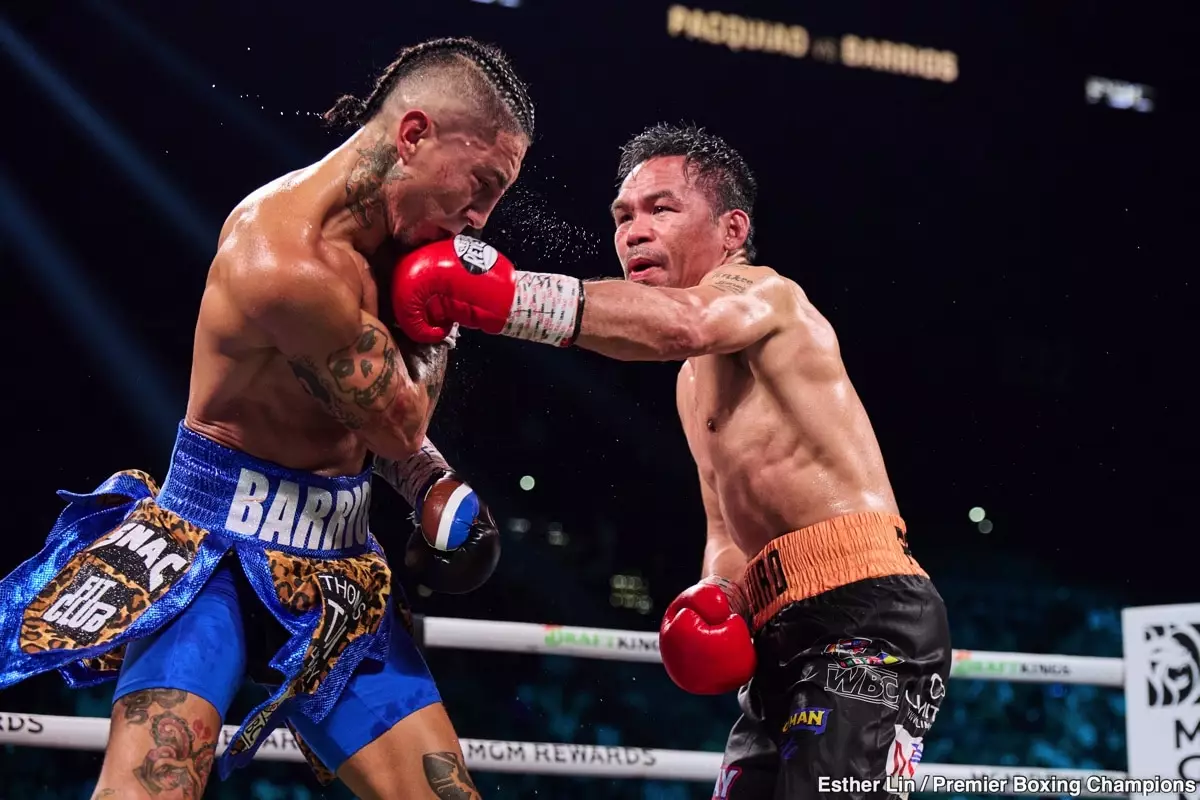In a boxing landscape often dominated by fleeting trends and overhyped prospects, Manny Pacquiao continues to defy expectations with a resilience that borders on the extraordinary. At 46, when most fighters hang up their gloves and settle into retirement or coaching, Pacquiao stepped into the ring against Mario Barrios. Many skeptics predicted a swift decline, a predictable end for a legend whose prime years are long gone. Yet, what unfolded was a testament not only to Pacquiao’s unmatched skill but also to his indomitable spirit. While the official judges declared the fight a draw, the real victory situates firmly with Pacquiao — a triumphant display of heart over mere numbers.
His comeback showcased a fighter who refuses to be written off by age or critics. For well over two decades, Pacquiao has been a symbol of perseverance, resilience, and artistry in the ring. His ability to adapt, to evolve his style even in the twilight of his career, reminds us why he is considered one of the greatest fighters of all time. The post-fight discourse, however, has centered not solely on his skills but on the nature of the fight itself, raising questions about how we assess greatness and resilience in boxing’s ever-evolving dialogue.
The Critical Voice and the Reality of Barrios’ Performance
Amid the applause for Pacquiao’s grit, a more contentious conversation emerges surrounding Mario Barrios’s performance. Notably, former two-weight world champion Paulie Malignaggi didn’t shy away from airing his frank opinion on the matter. On his podcast, he unabashedly labeled Barrios as “horrible,” even suggesting he might be among the worst champions he’s ever seen. Such a statement, loaded with negativity, sparks debate about the validity of his critique. Is Malignaggi’s opinion merely harsh, or does it underscore deeper flaws in Barrios’s approach and skill set?
Malignaggi’s critique stems from the perception that Barrios lacked the aggressiveness, technique, and respect-for-the-legend that a fighter of Pacquiao’s caliber demands. Leading into the fight, Barrios predicted a “kill or be killed” mentality, hinting at a aggressive approach inspired by past elite knockouts. Yet, what transpired was notably different. Abel Sanchez, a respected trainer, described Barrios’s approach as overly respectful, likening the fight to a sparring session rather than a competitive bout. Such a mindset arguably dissipated Barrios’s momentum, raising the question of whether he truly deserved another shot at a big payday—particularly against a legend still capable of delivering exceptional performances.
This raises critical reflections on what constitutes a worthy challenger. Is a fighter’s reputation solely based on their record and past achievements, or should it also reflect their current skill, aggressiveness, and willingness to take risks? Barrios’s subdued effort and apparent lack of strategic urgency cast doubt over his readiness for elite-level competition. Malignaggi’s harsh words reflect a judgment that Barrios’s performance was unworthy of a rematch, igniting the age-old debate around fighter legacies and the quality of competition.
Relevance of Future Matchups and the Power of Legacy
The discussion inevitably circles back to what’s next for Pacquiao. Despite the lingering questions about Barrios’s worthiness, the pursuit of lucrative and meaningful fights remains at the forefront. A rematch with Barrios seems less appealing, especially if his approach continues to lack the fire and ingenuity that once defined boxing’s finest. Instead, the options expand to a potential showdown with Rolly Romero, a younger contender with a burgeoning reputation, or even a carefully negotiated rematch with Floyd Mayweather, which promises both financial gain and nostalgic appeal.
Yet, behind these options lies a broader question: what does Pacquiao stand for in this stage of his career? Is he driven primarily by the love of competition, the desire to establish a final legacy, or the necessity of financial security? His recent performance, despite the controversial outcome, demonstrates that his legendary status isn’t merely built on past glories—it’s reinforced through his relentless pursuit of excellence, even when the odds are stacked against him.
Pacquiao’s journey challenges modern fighters and fans alike to consider the essence of greatness. It’s not solely about spotless records or unblemished victories but about resilience, adaptability, and the refusal to bow to the inevitable decline. Pacquiao embodies that ethos, reminding us that greatness isn’t confined by age or critics’ expectations but thrives on the unyielding human spirit.

